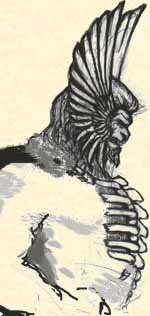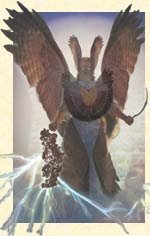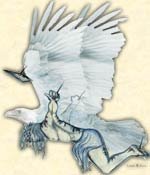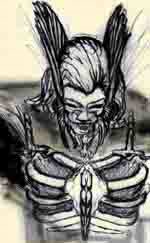(All images are property of, and may not be used without written permission from, Joseph N. Bishara.)
Tuesday, May 15, 2018
Sunday, May 4, 2014
Ba Ba Black Sheep [song]
Ba Ba Blacksheep - a song
(Joseph Bishara's version)
Ba Ba Blacksheep, have you any wool?
Yes sir. I guess sir.
I've three bags full.
One for my master, and one for my dame,
and one for the little boy who cries down the lane.
Ba Ba Blacksheep, have you any love?
No sir. I don't know sir.
I have a little of.
I've some for disaster, and some for disdain
and some in the alabaster box wherein I'm lain.
Ba Ba Blacksheep, are you yet renewed?
Well, sir, I can't tell, sir.
It may be too soon.
Worthless is how I'm known, and Dark is how I'm named,
But my fleece is now as white as snow, and golden is my mane.
Ba Ba Blacksheep, have you any shame?
Good day, sir. I can't say, sir.
There's no one by that name.
I can't recall my sorrows. I can't recall my pains.
And memories of the acts of love, in the end, is what remains.
JB
(Joseph Bishara's version)
Ba Ba Blacksheep, have you any wool?
Yes sir. I guess sir.
I've three bags full.
One for my master, and one for my dame,
and one for the little boy who cries down the lane.
Ba Ba Blacksheep, have you any love?
No sir. I don't know sir.
I have a little of.
I've some for disaster, and some for disdain
and some in the alabaster box wherein I'm lain.
Ba Ba Blacksheep, are you yet renewed?
Well, sir, I can't tell, sir.
It may be too soon.
Worthless is how I'm known, and Dark is how I'm named,
But my fleece is now as white as snow, and golden is my mane.
Ba Ba Blacksheep, have you any shame?
Good day, sir. I can't say, sir.
There's no one by that name.
I can't recall my sorrows. I can't recall my pains.
And memories of the acts of love, in the end, is what remains.
JB
Friday, April 26, 2013
Only I Can Lift It
ONLY I CAN LIFT IT
- by Joseph Bishara
------------------------
I sought to fix my broken patient
with my best intentions.
Oh that his soul could speak:
Mock my burden lying here.
Sneer at how far I've drifted.
But this weight is mine to bear.
Only I can lift it.
You can't help, and I can't share.
No matter how you're gifted.
The struggle's put into my care.
Only I can lift it.
Though I fall and gnash and swear,
With broken bones afflicted.
Stand aside and say a prayer.
Only I can lift it.
You've tried before, and failed for sure,
The bundle's unaffected.
But watch as I, lift it high.
Only I can lift it.
So mock this life I've picked up here.
Sneer and say you've lived it.
But know this life is mine to bear.
Only I can live it.
+JB
Tuesday, February 19, 2013
Notes From The Depths
After a particularly dark day as a medical student, I decided to document my innermost feelings of despair and sadness, censoring as little as possible, so that others could experience the easy spiraling descent a student can be lost to if coping mechanisms fail or are absent. Even now, removed from the threat of that day and having passed the test I was sure I had failed, I am shocked at my words, yet I write them here to show solidarity with those who think they're the only ones:
I took a major career-defining test all day yesterday. I studied for weeks for it. It was supposed to be a comeback whereby an old guy comes off the bench and knocks out the heavyweight champion. As I was taking the exam, it didn't feel like that. At the end of the 9-hour bout, I stared stunned at the computer screen telling me the test was over. As I left the testing center, I was consumed with the thought, "What if I just failed that thing?" A passing score on the United States Medical Licensing Exam Step 2 CK is one of a number of requirements for all MDs to be allowed to practice medicine in the United States. You get 352 questions in eight 44-question chunks wherein you get an hour for each chunk. It's all on a computer screen. Some questions are long and difficult to read, requiring lengthy blood lab value interpretation or complicated math formula computation. Some have more than one answer that could be right but you only get credit if you pick the "best answer".
If you take a minute to read the question, you get about 20 seconds to make your decision. If you don't pass, you don't practice. In some states, it's one-strike-and-you're-out. In others, it's three-strikes.
I left the exam not knowing if I had used a strike. I couldn't see straight. I could hear my breathing and I could feel my head throbbing. I drove around as the gravity of the possibility of failing settled in. I felt alone. I wanted a close friend but I also wanted to be alone. I let myself into a church and as I sat on the floor praying, I fell asleep, only to wake up prostrate to the reality that the possibility of a shambled professional life was still there.
A hundred thousand dollars plus in debt and a family I had drug into yet another career-seeking fiasco - "Boys, dad couldn't pass his test and can't get a job ... oh and sorry about spending your college tuition." I wondered if it would have been better had I never been born and if it would have been better if my wife had never met me. Had I infused the boys with some kind of "failure genes" that would predispose them to fail just as their dad had failed in medicine, education, video, filmmaking, engineering [not true but it felt like it at the time], and I was going to get to live with that knowledge that I couldn't teach them how to succeed.
And my wife ... I married a woman who'd follow me to hell, I just didn't plan on leading her there. The problem with marrying "up" - and I married a Saint with a capital S - is the unworthiness - the knowing that the most beautiful thing was disintegrating due to my clumsiness, like an intricate snowflake on my warm hand. To be clear, I never wished I were dead, mostly because it would make things vastly more difficult for a woman who deserved the best, and while I couldn't give her the best [or at least that's what it felt like], it was clear that widowhood would be the worst. Boys needed a great father who was successful, but what they got was me, and at least that was better than nothing.
I wish I were anonymous. That way, no one would care when I failed. They wouldn't shake their heads and avoid eye contact with me when they saw me at some other job.
I did pass that test. I got nice interview offers all over the country. I got a wonderful residency offer. The injustice of the experience however: for as miserable as I made myself feel during that dark time, I did not relish in the thrill of having survived and thrived (yet!). My only failure in retrospect was my focus.
I took a major career-defining test all day yesterday. I studied for weeks for it. It was supposed to be a comeback whereby an old guy comes off the bench and knocks out the heavyweight champion. As I was taking the exam, it didn't feel like that. At the end of the 9-hour bout, I stared stunned at the computer screen telling me the test was over. As I left the testing center, I was consumed with the thought, "What if I just failed that thing?" A passing score on the United States Medical Licensing Exam Step 2 CK is one of a number of requirements for all MDs to be allowed to practice medicine in the United States. You get 352 questions in eight 44-question chunks wherein you get an hour for each chunk. It's all on a computer screen. Some questions are long and difficult to read, requiring lengthy blood lab value interpretation or complicated math formula computation. Some have more than one answer that could be right but you only get credit if you pick the "best answer".
If you take a minute to read the question, you get about 20 seconds to make your decision. If you don't pass, you don't practice. In some states, it's one-strike-and-you're-out. In others, it's three-strikes.
I left the exam not knowing if I had used a strike. I couldn't see straight. I could hear my breathing and I could feel my head throbbing. I drove around as the gravity of the possibility of failing settled in. I felt alone. I wanted a close friend but I also wanted to be alone. I let myself into a church and as I sat on the floor praying, I fell asleep, only to wake up prostrate to the reality that the possibility of a shambled professional life was still there.
A hundred thousand dollars plus in debt and a family I had drug into yet another career-seeking fiasco - "Boys, dad couldn't pass his test and can't get a job ... oh and sorry about spending your college tuition." I wondered if it would have been better had I never been born and if it would have been better if my wife had never met me. Had I infused the boys with some kind of "failure genes" that would predispose them to fail just as their dad had failed in medicine, education, video, filmmaking, engineering [not true but it felt like it at the time], and I was going to get to live with that knowledge that I couldn't teach them how to succeed.
And my wife ... I married a woman who'd follow me to hell, I just didn't plan on leading her there. The problem with marrying "up" - and I married a Saint with a capital S - is the unworthiness - the knowing that the most beautiful thing was disintegrating due to my clumsiness, like an intricate snowflake on my warm hand. To be clear, I never wished I were dead, mostly because it would make things vastly more difficult for a woman who deserved the best, and while I couldn't give her the best [or at least that's what it felt like], it was clear that widowhood would be the worst. Boys needed a great father who was successful, but what they got was me, and at least that was better than nothing.
I wish I were anonymous. That way, no one would care when I failed. They wouldn't shake their heads and avoid eye contact with me when they saw me at some other job.
I did pass that test. I got nice interview offers all over the country. I got a wonderful residency offer. The injustice of the experience however: for as miserable as I made myself feel during that dark time, I did not relish in the thrill of having survived and thrived (yet!). My only failure in retrospect was my focus.
Loving The Ones You're With
I wrote the following after an experience I had in 2008:
For the first time, I saw a patient with dementia and it shook me to my core.
Its victim and her husband, both in their late-eighties, creaked through a hospital corridor, he escorting her. She, confused most of the time, would have momentary flashes of realization and we all knew she was rediscovering for a fleeting instant who and where she was - then cloudy puzzlement again. When they asked her name, she turned to her husband and asked him what it was. When asked to sign a document, she didn't know what to write and looked to her husband for clues as to the answer. And he, very patiently, answered her every question and corrected her every foolish remark.
Such a pretty lady did not match with the picture I had in my mind of a demented elderly lady. She was polite, gracious, and jovial with everyone. I thought this must be what it is like to see a person's soul -- when our brains, as part of our bodies, die, maybe what's left is the spirit, and hers was certainly peaceful and kind. The hospital staff seemed to know how vulnerable she was and was so careful with her. Her frail husband was quite the faithful sentinel. In all her world, her husband was the only steadily familiar presence, and she trusted him completely. For her sake, I was grateful he was alive, and I shuddered to think what would happen to her if he were to die first.
So what shook me? It wasn't her condition. It was the idea that it could happen to me, or worse to someone I love. What if that happened to my wife, the Lord forbid? Who would be there for her. Instantly, I wanted to take extra care of my body so that if that were to be her fate, she would have one face she could turn to in all her confusion and feel okay. I pushed the idea away about what they would do to her if I weren't around. I remember a friend telling me that when you're told a close loved one has a fatal disease, your ideas shift, and even food doesn't taste the same anymore.
For the first time, I saw a patient with dementia and it shook me to my core.
Its victim and her husband, both in their late-eighties, creaked through a hospital corridor, he escorting her. She, confused most of the time, would have momentary flashes of realization and we all knew she was rediscovering for a fleeting instant who and where she was - then cloudy puzzlement again. When they asked her name, she turned to her husband and asked him what it was. When asked to sign a document, she didn't know what to write and looked to her husband for clues as to the answer. And he, very patiently, answered her every question and corrected her every foolish remark.
Such a pretty lady did not match with the picture I had in my mind of a demented elderly lady. She was polite, gracious, and jovial with everyone. I thought this must be what it is like to see a person's soul -- when our brains, as part of our bodies, die, maybe what's left is the spirit, and hers was certainly peaceful and kind. The hospital staff seemed to know how vulnerable she was and was so careful with her. Her frail husband was quite the faithful sentinel. In all her world, her husband was the only steadily familiar presence, and she trusted him completely. For her sake, I was grateful he was alive, and I shuddered to think what would happen to her if he were to die first.
So what shook me? It wasn't her condition. It was the idea that it could happen to me, or worse to someone I love. What if that happened to my wife, the Lord forbid? Who would be there for her. Instantly, I wanted to take extra care of my body so that if that were to be her fate, she would have one face she could turn to in all her confusion and feel okay. I pushed the idea away about what they would do to her if I weren't around. I remember a friend telling me that when you're told a close loved one has a fatal disease, your ideas shift, and even food doesn't taste the same anymore.
Bad in the Best, Good in the Worst
So much good in the worst of us,
So much bad in the best of us,
It is hardly fitting for any of us,
To talk about the rest of us.
bad in the best of us,
good in the worst,
if anybody talks about the rest of us.
we only magnify our curse,Saab story
In 2005, I did something I never thought I'd do. I got on the internet to look for what was my "dream car" - a classic Saab 900. I ended up purchasing a 1994 Saab 900 Turbo Convertible Commemorative Edition - one of only 500 made of the very last year model for the car, and a collector's item to boot, though you wouldn't know it looking at the less-than-mint-condition fixer-upper.
I flew to Rhode Island and drove it cross-country back to Texas. I had an interesting drive home. I drove through New York City and drove it to see the Statue of Liberty. I stopped in St. Louis to see the big arch. I stopped in Kansas City to see my sister Miranda and go to church with her there. And I drove almost the whole way with the top down.
Then, on 9/11/2005, Sunday evening, I was going through Oklahoma City and I thought it might be nice to see the memorial honoring victims of the federal building tragedy. I followed signs in downtown directing me to the memorial, but for some reason, I got lost. And then something broke on the car -- the catalytic converter started dragging on the pavement -- not a big deal; simple inexpensive $30 repair but I needed to figure out a way to wire it to the exhaust pipe until I got to Lubbock. I was in a plain white t-shirt and jeans, rigging something on the bottom of the car. Not 5 minutes later, who do you suppose pulls up? Two police cars.
They asked me for identification. They frisked me for weapons or illegal items. They locked me in the back of their squad car. They ran all kinds of background checks on me. They checked the VIN number of the car and get a history of it. They pulled me out of the squad car, HANDCUFFed me, and asked me to sit on the side of the road. They repeated strange questions like, "You say you are from Lubbock, but why do you need to go to Rhode Island again?" They asked me about all the suitcases filled with clothes that relatives in Ohio gave me to donate to the church to give to poor people in third-world Egypt. "Why would your church need clothes from Ohio?" They opened the suitcases, the trunk, the glove compartment.
It was then that I remembered what my dad had told me years prior. "You're not white enough to dress badly. You have to dress nicely." It was clear to me that I was being detained because of the way I looked. I am ashamed to admit that at one point, I remember trying to show them photos of my white wife, as if to say, "See? Although I'm not white, my wife is." I wanted to wash the dark off of my skin so they wouldn't think I was a terrorist.
I remember that towards the end of the ordeal, the female officer told me they weren't able to access all the computer records from Rhode Island since it was Sunday. She said they would hold me in jail overnight but that I needn't worry since they weren't going to book me and nothing would be on my record unless something came up and that I since I had probably been in jail before, I knew that it wasn't a big deal and my car would be fine in the impound lot. She was surprised when I told her I had never been handcuffed before and had never been in jail before.
My wife was pregnant with our second son and there was no way I was going to call her from jail to tell her not to worry. I explained, rather firmly, that if they didn't have any reason to hold me, I needed to get back to her so she wouldn't worry and perhaps harm the baby in her distress.
Finally after around an hour and 15 minutes, they uncuffed me. They couldn't tell me how to get to the memorial. I said, "please just show me how to get back onto I-40," and I got out of that city as fast as I could. On the one hand it was very humiliating to feel helpless in the face of racial stereotyping and it made me sad that we live in times that perhaps the officers have to be like that. It could have been much worse and they were as civil as they could be. On the other hand, it makes a funny story once a little time and distance have been sprinkled on it.
Well, I got home. Except for some anticipated repair, the car is just fine. When I told the story to friends and colleagues, and while many were shocked and saddened and even angered, I was surprised to hear some laugh and say, "well what did you expect?" as though dark-skinned people ought to know not to travel in Oklahoma on September 11th.
It is an experience I am grateful for. Everyone should know what it feels like to wish you could take off your skin and your race when threatened with loss of freedom or danger to your family.
Subscribe to:
Comments (Atom)




















